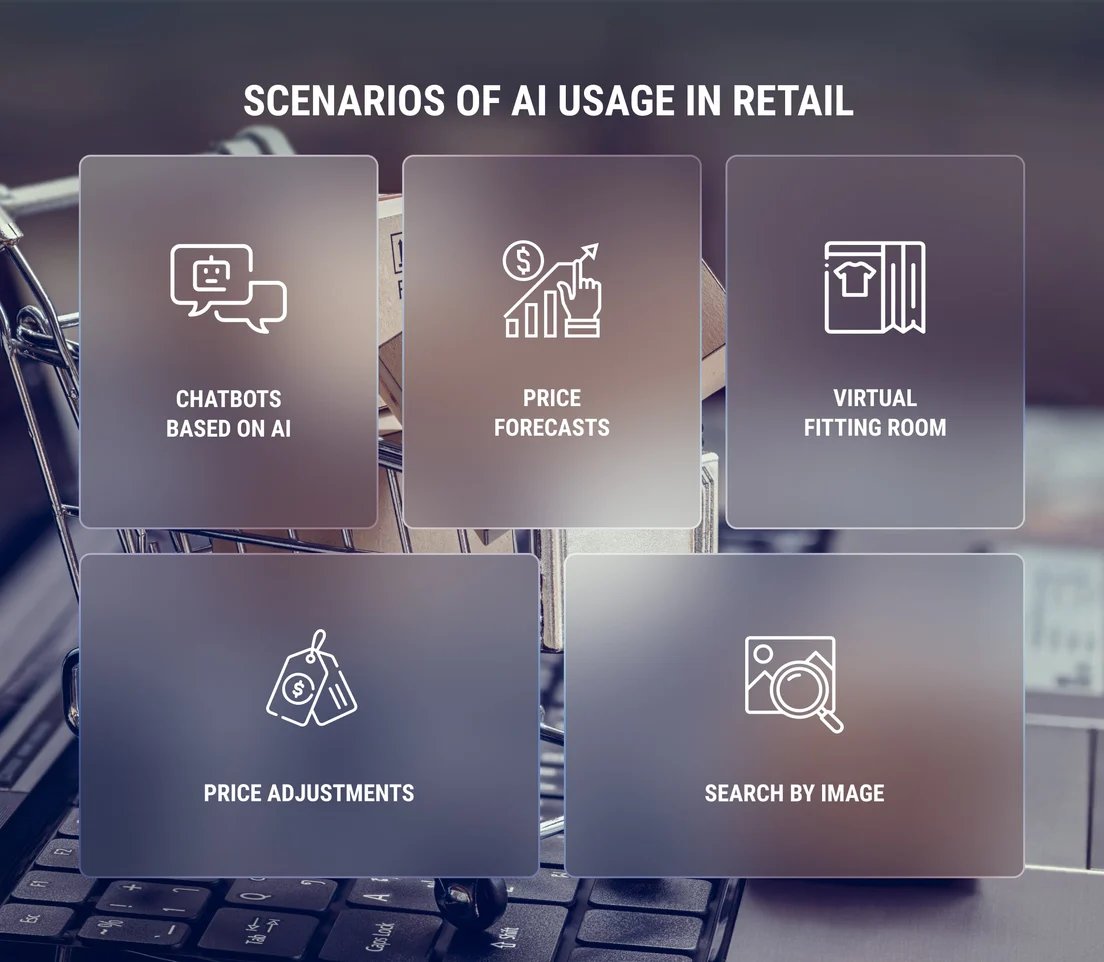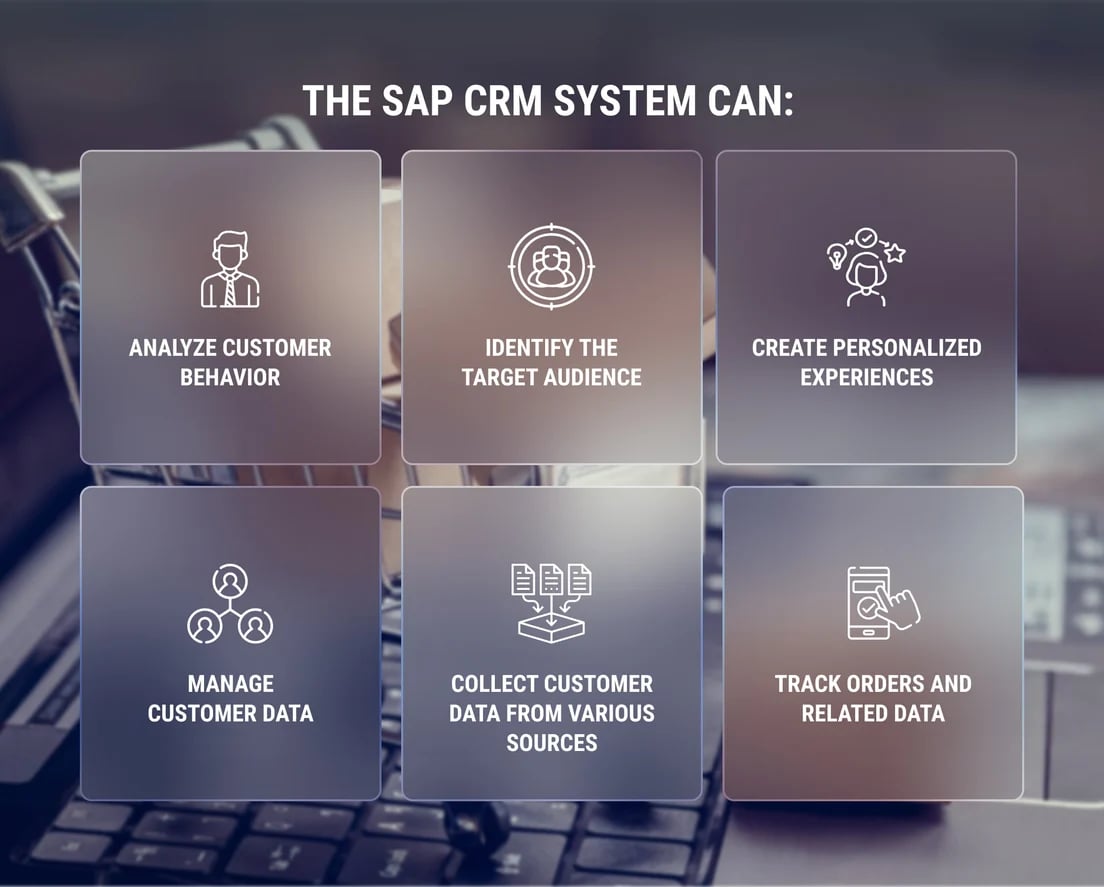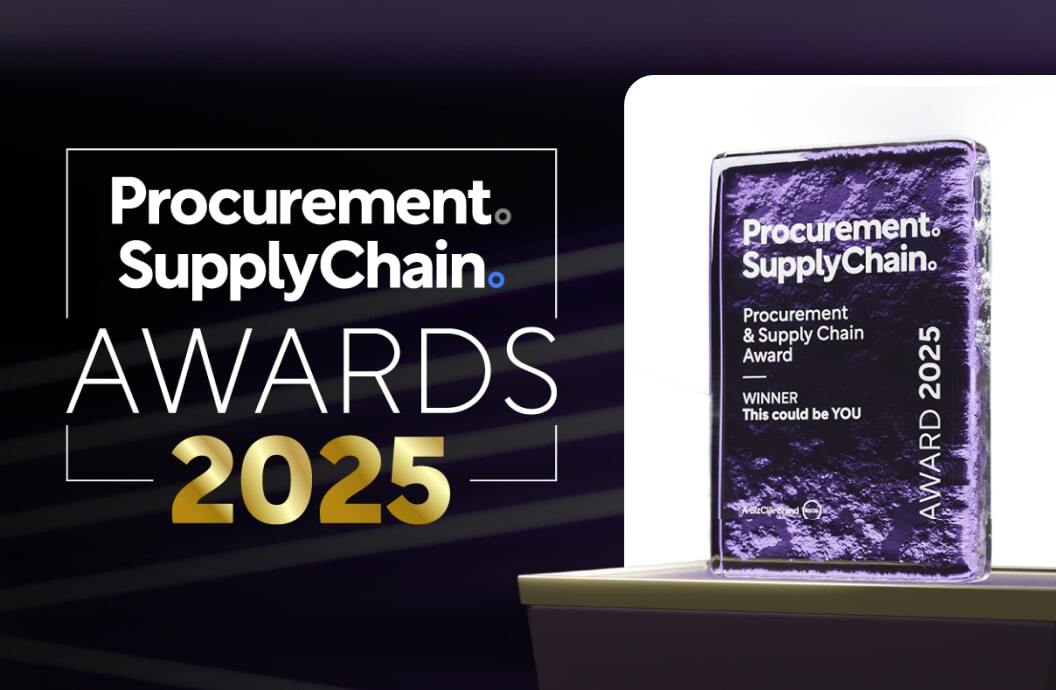This article delves into the prevailing trends shaping the retail industry, navigates the intricate landscape, and unveils the pivotal role SAP solutions play in driving success amidst such dynamism. Discover how SAP's innovative solutions are intricately woven into the fabric of the retail revolution, enabling businesses to adapt, thrive, and deliver unparalleled value to their customers in this ever-evolving marketplace.
Boosting Retail: Embracing 9 Technology Trends for 2025
The retail sector has undergone significant upheavals, propelled by shifts in consumer behavior, technological advancements, and the dynamic nature of the market. Faced with these transformative forces, retailers have expediently reexamined their strategies to cultivate and maintain customer loyalty.
This article delves into the prevailing trends shaping the retail industry, navigates the intricate landscape, and unveils the pivotal role SAP solutions play in driving success amidst such dynamism. Discover how SAP's innovative solutions are intricately woven into the fabric of the retail revolution, enabling businesses to adapt, thrive, and deliver unparalleled value to their customers in this ever-evolving marketplace.
1. Artificial intelligence (AI)
AI has played a pivotal role in the digital transformation of the retail sector, revolutionizing speed, efficiency, and accuracy across various business processes. Rather than replacing human employees, AI empowers businesses by providing relevant data for informed decision-making and personalized customer experiences. Retailers are increasingly leveraging AI-driven technologies that include:
Chatbots and conversational AI:
- Adoption of Chat GPT-like technologies that enable chatbots to recognize and respond to human language more naturally.
- Implementation of conversational AI to imitate support staff conversations, providing real-time assistance and personalized product recommendations.
Price adjustments and forecasting:
- Use of AI algorithms for dynamic price adjustments by visualizing outcomes of various pricing strategies.
- Integration of AI-driven forecasting tools that consider demand, seasonal trends, and product release dates to optimize pricing strategies.
Search by image:
- Integration of AI-powered visual search capabilities that allow customers to upload images of desired products and find similar items within the store's inventory.
- Enhanced customer experience through efficient and visually-driven product discovery.
Virtual fitting rooms and Augmented Reality (AR):
- Implementation of AI in virtual fitting rooms enables clients to virtually try on outfits and save time in the decision-making process.
- Utilization of AI-driven AR technology enhances the overall online shopping experience, particularly in the fashion and apparel retail sector.

SAP offers various AI-driven solutions that retailers can leverage to enhance operations, improve customer experiences, and drive business growth. Here are a few for you to explore:
- AI in SAP S/4HANA: SAP S/4HANA, SAP's next-generation enterprise resource planning (ERP) suite, incorporates AI and machine learning capabilities to optimize various business processes. For retailers, this could mean improved demand forecasting, inventory management, and supply chain optimization through intelligent automation and analytics.
- AI in SAP Analytics Cloud: SAP Analytics Cloud integrates AI and machine learning for advanced analytics and business intelligence. Retailers can use this solution to gain insights into customer behavior, analyze sales performance, and make data-driven decisions. Predictive analytics capabilities can assist in anticipating trends and optimizing inventory levels.
- AI in SAP Ariba: SAP Ariba, a procurement and supply chain management solution, integrates AI to optimize supplier management, automate procurement processes, and enhance decision-making. This can contribute to more efficient and cost-effective supply chain operations for retailers.
How you can benefit:
- Personalized recommendations. AI algorithms analyze customer behavior, purchase history, product views, and preferences to suggest tailored products.
- Demand forecasting. AI processes historical sales data, seasonal trends, and external factors (such as weather and holidays) to deliver accurate demand predictions.
- Dynamic pricing. AI-driven systems automatically adjust prices based on demand, competition, and current market conditions.
- Enhanced customer service. AI-powered chatbots and voice assistants handle customer inquiries in real time, provide consultations, and assist with order placement.
2. Automation with RPA
One of the tools driving efficiency and reducing operational costs in retail is Robotic Process Automation (RPA). For instance, combined with SAP solutions, RPA enables the automation of routine and repetitive tasks, freeing up employees' time for more critical responsibilities.
How does it work?
Inventory management
Through integration with RPA, SAP Integrated Business Planning helps forecast demand and manage supply chains by automatically monitoring inventory levels, placing orders, and analyzing sales data. This reduces the risks of overstocking or stock shortages.
Order processing
SAP S/4HANA, combined with RPA, streamlines order processing by automating tasks such as generating invoices, tracking order statuses, and sending notifications to customers.
Supply chain management
SAP Logistics Business Network offers advanced integration with RPA to optimize supply chain management. Bots can analyze supply data, forecast needs, and alert stakeholders about delays, enhancing coordination and preventing disruptions.
How you can benefit:
- Speed. Automated processes are significantly faster than manual work.
- Cost reduction. Lower costs for labor-intensive tasks allow resources to be redirected to strategically important areas.
- Accuracy. Eliminating the human factor minimizes the risk of errors.
- Scalability. RPA easily adapts to business volumes and new tasks.
3. Virtual Reality (VR) and Augmented Reality (AR)
According to PwC Research, 32% of consumers have used VR at least once for testing and purchasing products, while 19% have utilized this technology for acquiring luxury items. Virtual environments replace reality, providing maximum immersion and customer engagement by stimulating audiovisual perception.
Shopify reports that merchants who incorporate 3D content into their stores see an average increase in conversion rates of 94%. With minimal distinction between try-on and demonstration augmented reality, this technology unlocks numerous opportunities to engage and retain customers while boosting sales.
SAP mobile services support the implementation of AR features in brand applications, enhancing customer engagement and interaction.
How you can benefit:
- Personalized experience. AR and VR make brand interactions more tailored and engaging.
- Reduced returns. Customers can see how a product looks and "functions" before making a purchase.
- Increased sales. Visual product demonstrations help customers make decisions faster.
- Enhanced loyalty. A unique experience leaves a lasting impression and encourages repeat engagement.
4. Chatbots and Voice Assistants
According to Statista, 44% of shoppers find chatbots helpful when searching for product information prior to making a purchase. Additionally, IBM states that 80% of routine customer tasks and issues can be resolved using bots and voice assistants.
Voice technologies and chatbots are becoming essential tools for digital transformation in retail, enabling customers to interact with brands quickly, conveniently, and at any time. These solutions not only enhance service quality but also help businesses optimize processes, reduce costs, and boost conversion rates.
Areas to apply:
Customer support
Chatbots and voice assistants handle standard inquiries 24/7, such as checking product availability, order status, or processing returns.
Personalized recommendations
AI-integrated voice assistants analyze customers' purchase history to suggest relevant products or promotions.
Order placement and payment
Chatbots in messaging platforms (WhatsApp, Telegram) and voice assistants (Siri, Alexa) assist customers in finding products, placing orders, and making payments without visiting a website.
Interactive marketing
Voice technologies are used for conducting surveys, gathering feedback, and delivering personalized offers.
SAP offers specialized tools to develop and configure intelligent assistants, integrating them seamlessly into effective customer interactions. For instance, SAP Conversational AI enables the creation of intelligent chatbots that integrate with SAP solutions, including SAP Commerce Cloud and SAP Service Cloud. Additionally, SAP Business Technology Platform facilitates the development of customized voice assistants, allowing their integration into company business processes.
How you can benefit:
- Speed and convenience. Customers receive instant answers to their questions.
- Cost reduction. Automating standard inquiries reduces the workload on employees.
- Increased sales. Personalized recommendations and streamlined ordering processes boost conversions.
- Availability. Chatbots and voice assistants operate 24/7, enhancing customer service.
5. Personalization
Personalization is a pivotal strategy in the dynamic retail landscape, tailoring approaches to individual customers throughout their interaction cycle. Retailers enhance customer loyalty and elevate shopping experiences by leveraging historical and personal data and product and customer analytics.
Data utilization:
- Retailers analyze historical and personal data, shaping individual customer journeys.
- Personal data, including past purchases and browsing behavior, creates highly relevant interactions.
Analytics insight:
- Advanced analytics tools delve into customer behavior, offering valuable insights into product performance and preferences.
- Fine-tuned offerings based on analytics align with evolving trends and consumer demands.
- Solutions like SAP Analytics Cloud and SAP Business Intelligence (BI) empower businesses to gather, visualize, and analyze data comprehensively.
CRM solutions:
- CRM solutions like SAP CRM facilitate seamless interactions that comprehensively perceive individual preferences.
- Managing and analyzing customer interactions throughout the lifecycle ensures personalized engagement.

How you can benefit:
- Increased average order value. Personalized recommendations encourage customers to make additional purchases.
- Enhanced customer experience. Shoppers feel understood by the brand, which strengthens their loyalty.
- Reduced customer churn. Personalization fosters an emotional connection with the brand, helping to retain customers.
- Higher conversion rates. Customers are more likely to make purchases when presented with offers that genuinely interest them.
6. Omnichannel Approach
The omnichannel approach prioritizes consistent customer service across various platforms, be it mobile applications, websites, or physical stores. According to a Harvard Business Review study, 73% of consumers say they use multiple channels during their shopping journey; an omnichannel strategy focuses on enhancing overall customer experience and offers benefits like increased traffic, sales, and customer loyalty.
SAP Commerce Cloud, for instance, integrates with various channels, including online storefronts, mobile applications, and brick-and-mortar stores to ensure a unified and cohesive customer journey. This integrated approach allows retailers to provide a consistent brand experience regardless of the touchpoint, meeting the expectations of today's digitally connected consumers.
One of the key advantages of SAP in the omnichannel landscape is its ability to centralize customer data. SAP solutions enable retailers to gather and analyze customer information from different channels in real-time. This 360-degree view of customer interactions empowers retailers to personalize marketing efforts, tailor product recommendations, and anticipate customer needs across various touchpoints. By leveraging SAP's omnichannel capabilities, retailers can create a more personalized and responsive shopping experience, fostering customer loyalty and satisfaction.
Moreover, SAP's omnichannel solutions extend beyond customer-facing interactions to optimize backend operations. Inventory management, order fulfillment, and supply chain processes are seamlessly integrated, ensuring that retailers can efficiently meet customer demands regardless of the channel through which they engage. This end-to-end integration enhances operational efficiency and contributes to a more agile and adaptive retail ecosystem.
How you can benefit:
- Enhanced customer experience. Seamless channel integration allows customers to choose their preferred method of interaction.
- Increased sales. Engaging with customers across various channels attracts diverse target audiences, driving higher sales.
- Improved loyalty. A unified approach ensures customers feel comfortable and valued, no matter where they make their purchase.
- Data collection. Aggregating data from multiple sources provides a comprehensive view of customer behavior and preferences.
7. Smart Stores
This marks a new era in retail, where technology plays a pivotal role in delivering seamless and personalized customer experiences. These stores leverage a combination of IoT, artificial intelligence, big data, and other digital solutions to optimize business operations and offer customers a unique service level.
They are sometimes referred to as phygital stores, as they combine traditional in-store shopping with experiences from the world of digital retail. Here are a few examples of how this works:
IoT sensors and devices
In smart stores, IoT solutions like SAP Leonardo IoT monitor customer movement, inventory levels, temperature, and humidity, enabling efficient space management.
Checkout-free shopping
Solutions like Amazon Go allow customers to scan items using a mobile app and leave the store without going through a traditional checkout. Payments are processed automatically.
AI-driven insights
AI analyzes shopping habits and feeds data into SAP Customer Experience, a solution that forecasts demand and offers personalized recommendations. AI-powered chatbots assist customers in selecting products and answering questions in real time.
Customer behavior data
Smart stores collect data on customer behavior, such as movement patterns, interests, and purchase frequency. This helps retailers optimize product assortments and store layouts.
How you can benefit:
- Enhanced customer experience. Personalized recommendations, reduced shopping time, and convenient payment methods attract and retain customers.
- Improved operational efficiency. Automation lowers costs related to staffing, logistics, and inventory management.
- Cost reduction. Smart stores minimize losses through precise inventory tracking and theft prevention.
8. Loyalty 2.0
Loyalty is a cornerstone of customer retention, prompting many retailers to invest heavily in their rewards programs. However, the traditional “spend-and-earn” approach is no longer sufficient. Forward-thinking brands are now adopting a “Loyalty 2.0” strategy, which focuses on personalizing rewards within loyalty programs to better cater to individual customer preferences.
Loyalty 2.0 represents a move away from purely transactional “earn-and-burn” reward programs toward building customer-centric relationships. This approach leverages data, personalization, and innovative technologies to turn one-time buyers into loyal, repeat customers. These programs have become a vital component of retail’s digital transformation, helping to deliver a unique and engaging customer experience.

To implement the "Loyalty 2.0" strategy, you can consider the following SAP solutions:
- SAP Marketing Cloud allows audience segmentation and the creation of targeted marketing campaigns based on customer preferences.
- SAP Analytics Cloud provides businesses with analytical tools to monitor the effectiveness of loyalty programs and adapt them to changing customer needs.
How you can benefit:
- Increased average order value. Personalized offers encourage customers to purchase more.
- Strengthened loyalty. Interactive mechanics and personalization foster an emotional connection between the brand and the customer.
- Attracting new customers. Modern, eco-friendly, or socially-oriented programs appeal to conscious consumers.
9. Sustainable Shopping
Sustainable shopping has rapidly emerged as a significant trend in the retail landscape, driven by a growing consumer awareness of environmental issues and a desire to make ethical choices. A pivotal indicator of this trend is the finding that 58% of consumers express a willingness to pay more for eco-friendly products. This shift in consumer behavior reflects a broader commitment to sustainability and ethical consumption, prompting retailers to reevaluate their practices to align with the values of their eco-conscious clientele.
In response to this trend, SAP offers innovative sustainability solutions that empower retailers to seamlessly integrate sustainability into their operations. SAP S/4HANA, with its advanced analytics capabilities, allows businesses to track and analyze their environmental impact throughout the supply chain. This includes monitoring carbon emissions, water usage, and other key sustainability metrics. Additionally, SAP Ariba enables retailers to make sustainable sourcing decisions by providing insights into the environmental and social practices of suppliers. By incorporating these solutions, retailers can not only meet the demands of eco-conscious consumers but also demonstrate a genuine commitment to sustainability throughout their business processes.
Moreover, SAP's broader suite of sustainability solutions, such as SAP Sustainability Control Tower, assists retailers in comprehensively monitoring and managing their sustainability performance. This centralized platform allows businesses to track, measure, and report on various sustainability metrics, fostering transparency and accountability. As sustainable shopping continues to gain momentum, SAP solutions empower retailers to not only meet consumer expectations but also contribute to a more sustainable and responsible global supply chain.
How you can benefit:
- Increased customer loyalty. Conscious consumers value brands that share their values.
- Attracting new customers. Generation Z and Millennials actively support environmentally responsible companies.
- Cost reduction. Sustainable practices, such as waste reduction and energy savings, help lower operational expenses.
- Competitive advantage. Sustainability is increasingly becoming a key factor in brand selection.
How LeverX Can Help
LeverX has been driving business digital transformation for over 20 years, establishing itself as a reliable technology partner for companies worldwide, including Fortune 500 organizations. We offer our clients:
- Expertise in retail. We understand the unique needs of the industry and provide the best solutions.
- Partnership with SAP. Since 2003, we have closely collaborated with the vendor in the development, implementation, and enhancement of SAP solutions.
- Implementation of personalized approaches. LeverX will assist in developing customized business growth strategies and implementing tools to support their execution.
- Support for sustainable development. Our team will help implement sustainable practices in your business to reduce its environmental impact.
Our service package also includes:
- Consulting
- SAP solution implementation
- Custom software development
- Post-release support for IT products
We Also Offer Our Expertise, Backed By Numerous Successful Projects
Case study #1. Transforming accounting processes for a major supermarket chain
Client:
The largest supermarket chain in Uzbekistan, Makro.
Scope of work:
- Transformation of accounting processes to adopt IFRS, enhancing sales, logistics, and control processes
- Ensuring transparency in financial and management accounting to reduce labor costs for operational tasks
- Integration with the faktura.uz platform for invoice exchange and digital signature in the ERP system, as well as integration with the State Inspection of the Republic of Uzbekistan
- Automated updates of exchange rates based on the Central Bank of Uzbekistan and price calculations reflecting current exchange rates
- Increasing warehouse turnover
- Reducing the time required to process incoming and outgoing documents
Results:
- 20% increase in warehouse turnover
- 40% reduction in the time spent processing incoming and outgoing documents
- 30% improvement in financial transparency
Case study #2. Multiplying distributor sales with an analytical platform
Client:
A company working with distributors of beverages and food products.
Scope of work:
- Gathering and analyzing requirements to develop appropriate solutions and approaches
- Integration with multiple data providers, including SAP, SFTP servers, and Rest APIs
- Setting up DevOps processes using a Kubernetes cluster, GitLab CI/CD pipelines, and Grafana for monitoring visualization
- Software testing after development and migration to a new technology stack to ensure seamless functionality
- Ongoing support for the solution and development of new features upon request
Results:
The LeverX team successfully designed and implemented a sales analytics platform, delivering an efficient, user-friendly, and well-thought-out solution for the client.
Case study #3. Developing an omnichannel e-commerce solution and its integration with SAP
Client:
An American developer and manufacturer serving various industries, with over 10,000 employees and 50 branches worldwide.
Scope of work:
- Development of an omnichannel e-Commerce platform
- Creation of customized product catalogs
- Configuration and implementation of SAP Hybris Commerce
Results:
- Streamlined synchronization and structuring of data
- Improved market trend forecasting
- Enhanced sales efficiency
- Improved customer service quality and attraction of new customers
Case study #4. Configuring SAP for a major food retailer
Client:
One of the leading food retailers, also managing its own logistics services, direct imports, and a range of digital services for partners.
Scope of Work:
- Implementation of transportation business processes using SAP solutions for retail
- Development and support of reports and dashboards
- Creation of Fiori applications tailored to the client's specific requirements (marketing processes)
- Implementation of personnel evaluation and training processes
- Development of a custom merchandising solution based on third-party technologies (Python).
Results:
- Modifications and developments by our specialists improved the efficiency of the client's marketing and HR processes.
- The implementation of new reports in SAP BW provided access to consolidated data on inventory and defective products.
- This allowed business users to analyze the causes of stock surpluses and defective goods, forming the basis for optimizing distribution processes.
- As a result, the client increased the profitability of their products.
Learn details
The Bottom Line
Retail is undergoing a period of intense transformation, and success in this field requires the implementation of innovative, customer-centric solutions — now, not later. LeverX is ready to be your partner in this journey, offering not just technologies but also deep expertise to help you achieve your ambitious goals.
Our dedicated team is committed to offering insights into the dynamic landscape of the retail industry and providing tailored solutions that foster sustainable growth. We understand the challenges and opportunities presented by the evolving retail ecosystem and are poised to collaborate with you to maximize your potential. By sharing your specific requirements, you open the door to a partnership that goes beyond conventional solutions, ensuring that your retail business not only adapts but thrives in the face of industry transformations. Let's embark on this journey together, forging a path toward lasting success in the ever-changing retail landscape.
To find out how we at LeverX can help you implement innovative retail solutions and refine the operational facets of your retail business, complete the form below.
How useful was this article?
Thanks for your feedback!
.webp)
.webp)

